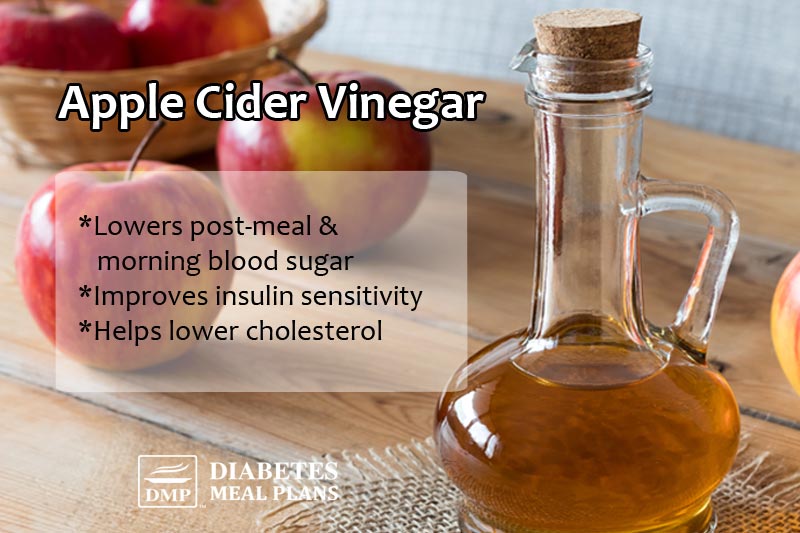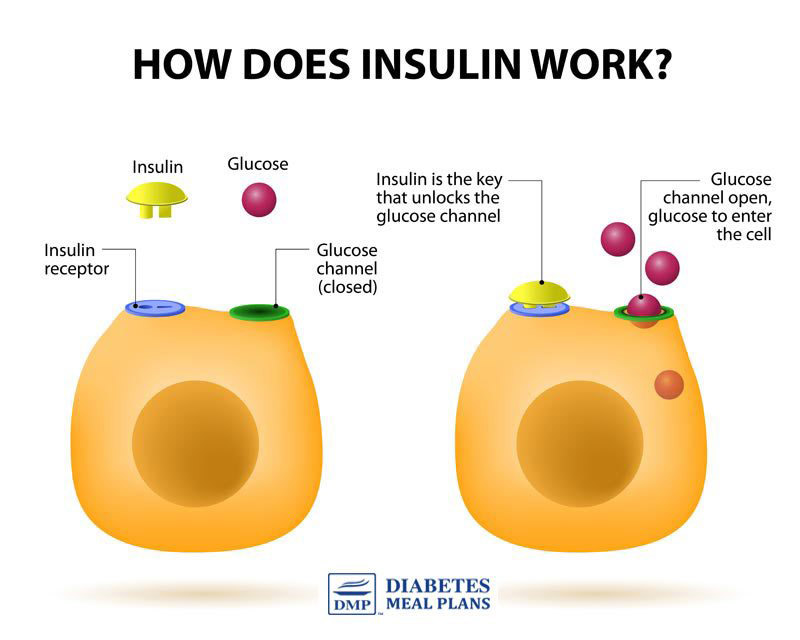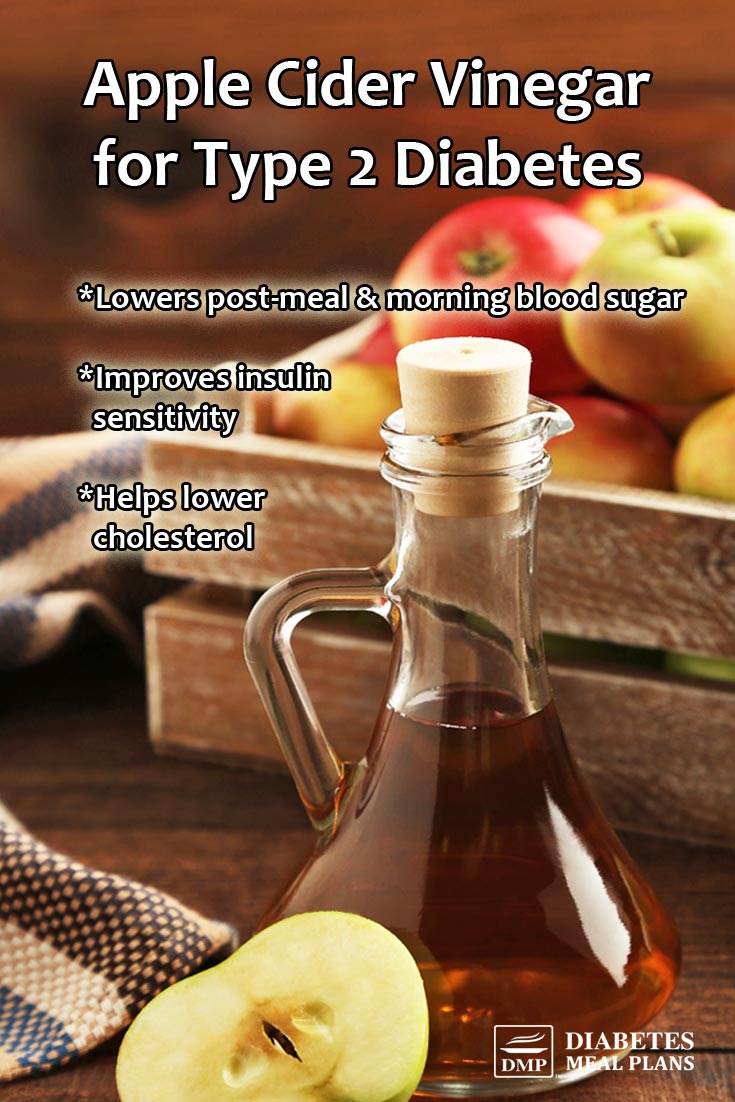In your endeavors to learn more about managing your prediabetes or type 2 diabetes, you may have heard that apple cider vinegar (ACV) can provide some assistance to you.
And it’s true.
Interestingly, before the introduction of blood glucose-lowering medication, vinegar was one of the most commonly used natural remedies for diabetes.
Now modern science has confirmed it may have a significant influence on assisting with blood sugar management.
If you’re curious to know the facts, keep reading. You’ll soon find out, ACV has several impressive health benefits.

What is Apple Cider Vinegar & How Does it Work?
Apple cider vinegar (ACV) is a specific type of vinegar that is made by fermenting apples with yeast and bacteria.
The fermentation process may sound a little gross, but keep an open mind. Because ACV is so good for you that many have labeled it as the “superfood” that everyone should have in their pantry.
Unlike white vinegar, ACV is tinted slightly brown. You may also find that your organic ACV is a bit cloudy, which is normal.
Organic ACV that is unpasteurized also contains a substance known as the “mother,” which is made up of enzymes, protein strands, and probiotics – all of which provide great health benefits for you!
How does it work exactly?
The active ingredient of ACV is “acetic acid.” This acetic acid, along with the “mother,” are thought to be responsible for the many health benefits of ACV.
And, as it turns out, there are plenty of health benefits that are relevant to people with type 2 diabetes and prediabetes, that have been confirmed by research.
Let’s learn more…
ACV & Blood Glucose Levels
With prediabetes or type 2 diabetes, keeping your blood sugar levels stable should be your number one priority. And as it turns out, drinking ACV may be able to help you achieve that goal, a little easier.
In one study researchers tested 4 different meal combinations and their effect on postprandial (after-meal) glucose levels.
Participants were given either:
- the control meal, consisting of just a vanilla milk rice solution, with glucose dissolved in water
- milk rice solution with 4 g of cinnamon mixed in
- milk rice solution with 28 mmol/L (1.68 g) of acetic acid mixed into the glucose drink
- milk rice solution, cinnamon, and acetic acid consumed together
The researchers found that the participants consuming both the acetic acid and cinnamon in combination, experienced lower blood glucose levels 15 minutes after the meal, demonstrating an additive effect for the two substances used together.
Another study set out to test the effects of three different doses of vinegar (18, 23 and 28 mmol acetic acid) on postprandial glucose and insulin responses after a carb-heavy meal. After an overnight fast, participants were given white bread for breakfast, containing 50 grams of carbs.
The results showed that compared to the control meal, all participants had lower blood sugar and insulin. They also discovered that the higher the ACV dose, the better the response, indicating that the more ACV people consumed the lower their metabolism reacted.
Further to this, the researchers also discovered that ACV helps improve satiety (feeling of fullness) at the time of the meal, and prolong satiety as well – meaning people didn’t get as hungry so soon.
Another study reported that after ingesting 300 mg ACV (acetic acid) twice per day (taken in pill form), type 2 diabetic patients saw their A1c values drop by 0.16%.
And yet another study found that when patients were given ACV with a high-carb meal (75 grams carbs), blood sugar spikes were reduced and so were post-meal glucose levels.
Overall, research suggests that adding 1-2 tablespoons of ACV to your routine has the potential to lower post-meal blood sugar by as much as 25% to 35%!
If you struggle with morning highs, you’ll be pleased to learn that ACV may help in this regard as well.
Having 2 tablespoons of apple cider vinegar with 1 oz (28 g) cheese (which is just 1 slice cheese) before bed has been shown to reduce fasting blood glucose levels by 4%, compared to 2% when the participants only had cheese and water.
And interestingly, people that had a typical fasting glucose above 130 mg/dl (7.2 mmol/l) had an even greater reduction of 6% in morning blood sugar levels.
ACV & Insulin Sensitivity
Most type 2 diabetics have a poor response to insulin. Normally the cells in the body are meant to open/ unlock when insulin sends it’s call, but with diabetes or prediabetes your cells can be insulin resistant.

Thankfully, research has shown that vinegar can substantially improve the insulin response after a meal, even in people who are insulin resistant.
One study reported that after giving participants with insulin resistance a carb-heavy meal, those who drank a solution with 20 g apple cider vinegar two minutes before the meal experienced a 34% increase in whole body insulin sensitivity (at the 60 min mark, postprandially) when compared to the placebo group.
Another study gave diabetic participants either vinegar (30 mL) or a placebo (water) before feeding them a mixed meal containing carbs, fat, and protein. The group given vinegar had greater muscle glucose metabolism (765 μmol/100 mL tissue) than the placebo group (579 μmol/100 mL tissue), indicating that the vinegar improved insulin sensitivity and glucose uptake in muscle cells.
Please pin, tweet or share; then keep on reading.

ACV & Cholesterol
Another set of blood work to keep an eye on are your cholesterol and triglyceride levels. These are indicators of both metabolic and cardiovascular health, and not surprisingly, ACV has a positive effect on these as well.
Researchers found that when people with type 2 diabetes drank 30 mL of vinegar before a meal, it decreased total triglyceride levels.
ACV has also been shown to help reduce LDL “bad” cholesterol and increase HDL “good” cholesterol, in both healthy and diabetic rats.
Dosage and Best Forms of ACV
You can consume vinegar in several ways – directly drinking vinegar (mixed with a little water to dilute it), in a salad dressing, or in supplement form.
The most straight forward way to consume it is to simply mix 1-2 tablespoons (30 mL) of organic, unfiltered ACV into a cup of water and drink it a few minutes before each meal.
Drinking ACV as a liquid may be the most absorbable method, but there is some concern in the medical community about the acetic acid causing damage to tooth enamel. If this is a concern for you, you can drink your ACV solution with a straw to limit dental exposure to the acid.
Alternatively, you can purchase ACV supplements (as capsules) and take those before each meal. Capsules are also great for people who can’t stand the taste or stomach the idea of drinking down plain vinegar and water.
Of course, you can also routinely incorporate ACV into salad dressings, vinaigrettes, and marinades.
Just beware that anyone with gastritis or ulcers should be cautious with strong acids like ACV, as they can cause stomach irritation in some.
Please pin, tweet or share this info to help inform others – thanks!


Sheila Yager
Is regular vinegar without the mother ok to drink with water?
Emily - Dietitian (MS, RD)
Apple Cider Vinegar seems to be the most popular vinegar in terms of research. With that being said, there does seem to be a blood sugar lowering effect with all vinegar which you can read about in this article.
Liz
Is it ok to take ACV as I am taking aspirin & a beta blocker – does this effect the medication ?
Emily - Dietitian (MS, RD)
Check with your doctor, Liz.
Jim Harless
Best way to use A CV if you are already under treatment for high level acid reflux? Jim
Emily - Dietitian (MS, RD)
Best bet is to check with your doctor, Jim. There is some belief that ACV might improve symptoms of acid reflux, but there isn’t a ton of quality research to back that claim. Alternatively something like an ACV capsule might be good, if you’re looking for the diabetic benefits of ACV without having to drink straight acetic acid.
Bob Shamhart
I was having reflux and heart burn issues and a naturopathic MD I went to said to drink sour kraut juice…just a swig when I was having issues and it worked! Can’t hurt to try it.
Tracy
How about 2 tablespoons of ACV in 8 oz glass of water with just a bit of cranberry juice to take the edge off? Is this combination ok for type 2?
Emily - Dietitian (MS, RD)
Adding juice of any type will add unwanted sugar to the beverage- so in general we encourage you to stay clear of juice. A better solution would be to use more water so that you dilute the ACV a bit more. If you do end up using the juice, make sure you pick one with no added sugar or high fructose corn syrup.
Peter Allen
Is having ACV with manuka honey wrong to have withT2?
Emily - Dietitian (MS, RD)
We do not encourage you to consume honey! It’s a common misconception that honey is a healthier choice than sugar, because essentially they are both the same! Read more about honey in this article!
Cindy
Is it ok to mix your ACV in with hot tea? Or does the water have to be cold? I’ve drank it mixed with hot green or black tea and lime or lemon juice before and it wasn’t to bad.
Jedha: Nutritionist (MNutr)
In tea should also be fine, though if using it in the evening to lower morning sugar you don’t want to take it with green or black tea as they both contain caffeine. And herbal tea would be a better option.
ian martin
So the 40l of home made cider that went a bit awry and turned into 40l of organic unpasteurised apple cider vinegar may be useful after all #christmaswin
Jedha
Yes Ian, perhaps it may! :)